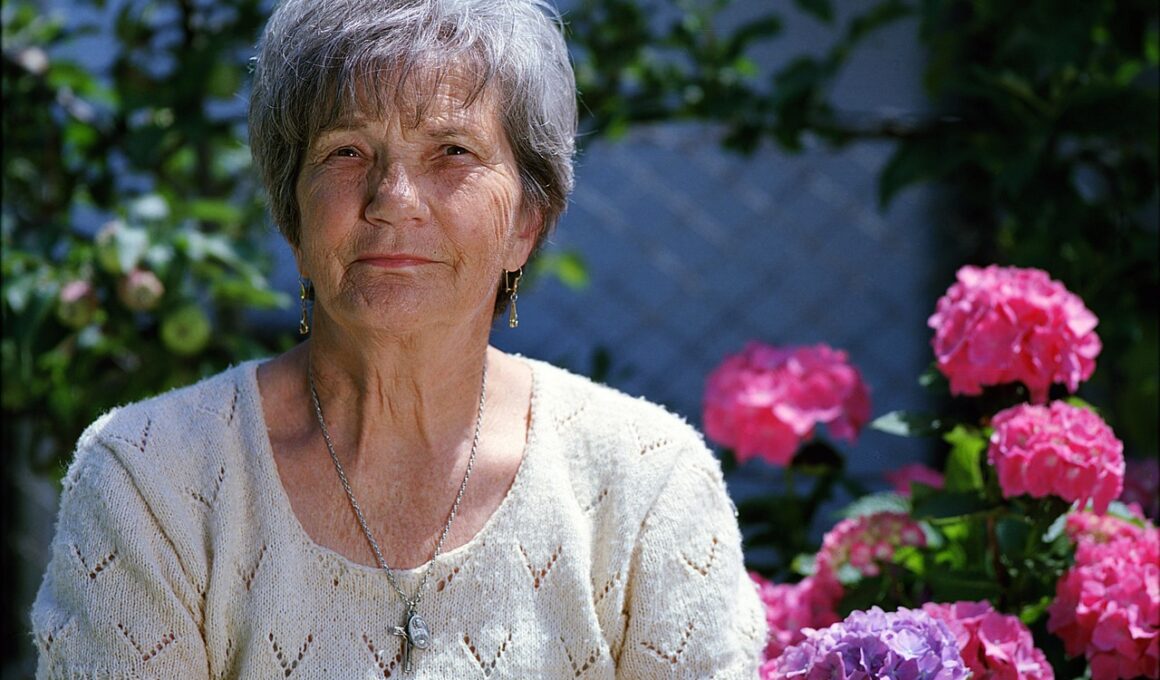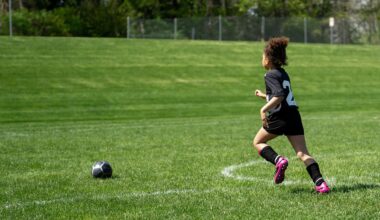Aerobic Exercise and Cognitive Function in Older Adults
Aging is an inevitable process that many individuals experience, bringing various physical and cognitive changes. Research has increasingly focused on the interplay between exercise and cognitive health in older adults. Aerobic exercise specifically has gained attention for its potential to enhance cognitive function. Regular participation in aerobic activities contributes to improved cardiovascular health, which, in turn, supports brain health. By promoting increased blood flow and oxygenation to the brain, aerobic exercise fosters neuroplasticity and may enhance overall cognitive function. Moreover, studies indicate that engaging in aerobic exercise may help slow cognitive decline associated with aging. This includes the risk of dementia and Alzheimer’s disease. In addition to these benefits, aerobic exercise can reduce symptoms of anxiety and depression, common conditions affecting older adults. It is crucial for older adults to incorporate aerobic activities into their daily routines to maintain cognitive function and overall wellness. This will not only benefit their mental health but also enhance their quality of life, enabling them to remain active participants in their communities and maintain independence. Therefore, understanding the impact of aerobic exercise on cognitive health is essential.
Building a solid exercise routine can significantly contribute to enhancing cognitive function in older adults. Engaging in regular aerobic exercises, such as walking, swimming, or cycling, can have remarkable positive impacts on the brain. Studies demonstrate that such activities help in releasing endorphins, which enhance mood and emotional well-being. To tailor an effective exercise program, older adults should consider their personal preferences and any physical limitations. Consulting with healthcare professionals can help ensure the proposed activities are safe and effective. Some suggested aerobic exercises include:
- Walking at a moderate pace
- Joining a water aerobics class
- Participating in group cycling sessions
- Taking part in dance-based activities
Additionally, maintaining consistency in aerobic exercise routines can amplify cognitive improvements and overall health benefits. Participating in community-based classes can provide social interaction, further enhancing emotional health. The support and motivation found within group settings often lead to increased adherence to exercise programs. Thus, it is vital for older adults to find enjoyable activities they can commit to regularly to experience the cognitive benefits of aerobic exercise.
Cognitive Benefits of Aerobic Exercise
Engaging in regular aerobic exercise can yield numerous cognitive benefits, particularly for older adults. Various studies have highlighted how such exercises can improve memory, attention, and executive functions. Scientific findings suggest regular aerobic activity enhances the size of the hippocampus, the brain region crucial for memory and learning. Enhanced blood flow and oxygen delivery to the brain during aerobic activities help stimulate the production of growth factors, essential for brain health. Additionally, aerobic exercise promotes the release of neurotransmitters that improve mood and cognitive performance. From walking to swimming, every bit of movement counts towards fostering better brain function. The integration of aerobic exercise into daily routines for older adults can also mitigate factors associated with cognitive decline. This is especially relevant in light of findings indicating that sedentary lifestyles contribute adversely to brain health. The key is consistency and finding the right type of aerobic exercise that suits individual preferences. Importance should also be placed on gradually increasing exercise duration and intensity, allowing the cognitive benefits to unfold over time. Ultimately, older adults can maintain a sharp mind through sustained aerobic activity.
Social interaction plays a fundamental role in the cognitive health of older adults engaging in aerobic exercise. Participating in group activities, such as dance classes or walking clubs, provides opportunities for socialization and community building. These elements are critical, as social engagement has been linked to improved mental health and cognitive function. Aerobic exercises in a group setting can offer motivation and support, making workouts more enjoyable and effective. Studies suggest that older adults who engage socially while exercising report higher satisfaction and sustained participation. Additionally, laughter and camaraderie in social exercise settings can significantly boost well-being. This enjoyment can lead to longer-term adherence to exercise routines, reinforcing cognitive benefits. Hence, it’s vital for older adults to not only focus on the physiological aspects of aerobic exercise but also on creating enjoyable social connections through these activities. Incorporating both exercise and social interaction may produce better overall outcomes for cognitive health. Community resources such as local gyms or recreational centers can be beneficial in fostering such group activities. Therefore, prioritizing social aspects alongside physical exercise enhances the effectiveness of aerobic routines in older adults.
Challenges and Barriers to Exercise
While the benefits of aerobic exercise for older adults are clear, several challenges can hinder participation. Physical limitations, fear of injury, and lack of motivation are common barriers faced by many seniors. Older adults may also experience chronic health issues affecting their ability to engage in regular exercise. Thus, it is essential to identify these barriers and address them effectively. Raising awareness about the safety of aerobic exercise for older adults can help alleviate fears. Healthcare providers play a crucial role in encouraging exercise and guiding individuals in creating tailored exercise plans. Additionally, support systems, including family members and caregivers, can inspire seniors to participate in aerobic activities regularly. It is also important to provide appropriate resources like accessible exercise facilities and trained professionals to assist older adults during aerobic activities. Offering group classes tailored for seniors can create a supportive environment where they feel comfortable and motivated. Ultimately, addressing the challenges and limitations faced by older adults is essential to create an inclusive culture that celebrates aerobic exercise as a key contributor to enhancing cognitive function and longevity.
Nutrition plays an integral role in supporting the cognitive benefits yielded by aerobic exercise in older adults. A well-balanced diet rich in essential nutrients can enhance the effectiveness of exercise on cognitive health. Consuming adequate fruits, vegetables, whole grains, healthy fats, and proteins can support brain function and promote overall well-being. Certain nutrients, such as omega-3 fatty acids, antioxidants, and vitamins B, D, and E, have been linked to improved cognitive function. Maintaining proper hydration is also crucial, as even mild dehydration can affect cognitive abilities. Combining regular aerobic exercise with a healthy diet can create a robust approach to enhancing cognitive function in older adults. Creating awareness about proper nutrition and its connection to exercise may inspire older adults to adopt healthier eating habits. Community programs advocating wholesome foods and balanced diets can further encourage seniors to nourish their bodies effectively. In summary, integrating nutrition with aerobic exercise highlights the holistic approach required to optimize cognitive health in older adults, ensuring they can remain mentally agile and effectively engage in daily activities.
Conclusion
In conclusion, aerobic exercise presents numerous cognitive health benefits for older adults. Regular engagement in such activities can significantly improve memory, attention, and overall brain function. Through aerobic exercises, seniors can also foster social connections that enhance emotional well-being. The collective impact of physical activity and social interaction contributes to maintaining mental agility. Overcoming barriers to participation, such as addressing fears and physical limitations, is essential. Encouraging supportive environments and tailored exercise programs can help seniors remain active. Furthermore, awareness of nutrition’s role in cognitive health should be emphasized, underscoring the importance of healthy eating in conjunction with exercise. Cumulatively, this can create a comprehensive strategy that promotes cognitive well-being in older populations. Thus, it is crucial for healthcare providers, families, and communities to actively support older adults in maintaining an active lifestyle through aerobic exercise. Prioritizing cognitive health in older adults allows them to enjoy better quality of life and independence. This holistic approach is not just about extending life; it is about enhancing the quality of living. Therefore, embracing aerobic exercise as a fundamental component of a healthy lifestyle is necessary for older adults.
Implementing regular aerobic exercise can yield transformative cognitive and physical health benefits in older adults. Research shows that aerobic exercise significantly contributes to releasing endorphins, promoting better mood and lowering anxiety levels. Engaging in activities such as jogging, swimming, or cycling not only helps maintain physical well-being but is vital to brain health. Consistent participation in aerobic activities has been linked to improved memory retention and slower cognitive decline. The pattern of increased physical activity is positively correlated with enhanced mental functions, demonstrating that movement is essential even in later stages of life. Additionally, aerobic exercise boosts connectivity within the brain, strengthening neural pathways beneficial for overall cognitive function. Integrating such exercises as part of a daily routine encourages older adults to remain focused, alert, and engaged. It also fosters independence and self-sufficiency, enhancing life satisfaction. While barriers may exist, innovative programs tailored for seniors can promote participation. Educational campaigns highlighting the cognitive benefits of regular aerobic exercise can also uplift community awareness. Therefore, considering aerobic exercise as a vital part of a holistic approach to health can lead to improved outcomes for older populations.


